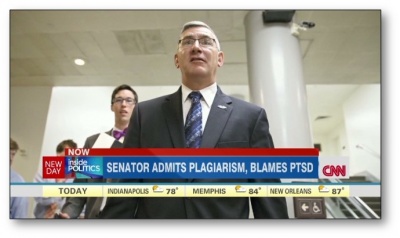Difference between revisions of "John Walsh Thesis Revision"
(→Arab Support for Democracy) |
(→Page 3) |
||
| Line 20: | Line 20: | ||
= Page 3 = | = Page 3 = | ||
| + | While acknowledging that the basic elements of a democracy will be different based on the cultural, economic, and social systems found in a given society leaves room for some imprecision in the application of the definition, a working definition of democracy that is largely accepted by political scientists who endorse what is known as the Democratic Peace Theory amounts to: | ||
| + | 1. The nation must hold competitive elections. To be defined as competitive, there must be at least two formally independent political parties (or similar groups). | ||
| + | 2. 50% or more of the adult population must be allowed to vote. | ||
| + | 3. Those in legislative and executive power must have been put into place by said elections. | ||
| + | 4. There must have been at least one peaceful, constitutional transfer of power between independent political parties. | ||
| + | Nations which do not meet all four conditions might be considered emerging democracies or republics, but would not be considered democracies until they met all four conditions. | ||
| + | |||
| + | While this definition of democracy is fairly strict, most nations that are considered democracies fit these criterion. Most nations that are not usually considered democracies, especially middle eastern nations, do not meet all of these criterion, and therefore can be considered protodemocracies. There are also some nations, for example North Korea, who do not meet any of these criterion. | ||
| + | |||
| + | This definition will also allow us to easily tell the difference between democracy and liberal democracy, under a liberal democracy the vast majority of adults must be eligible to vote, and freedom of political speech and press must be enshrined in the system of law. Thus the United States, for example, would not have qualified for "liberal democracy" status until the 19th amendment was ratified to give women the right to vote and it didn't fully meet the promises of liberal democracy until it guaranteed the franchise to blacks some 40 years ago. | ||
| + | |||
| + | A fundamental part of democracy is the ability of the people to elect and remove their leaders. This democratic movement has spread and now many countries hold such elections. | ||
= Page 4 = | = Page 4 = | ||
Revision as of 07:58, 11 April 2019
This page is an exercise in revising a massively plagiarized master's thesis by paraphrasing portions of the text that were either quoted without attribution (no citation) or quoted inappropriately (no quotation marks). In both cases we will re-write individual paragraphs and deposit the results here, by page number.
Here is a link to the New York Times article.
Instructions:
- Type on your personal notebook a piece of text (paragraph) from the page represented in the New York Times article of July 23, 2014.
- Edit to rephrase in your own words, avoiding close paraphrasing as much as possible.
- Cut and past results into this document on the proper page in the proper order, if possible.
- Do minor formatting or editing as needed.
- BONUS. If you are editing a passage without attribution, insert the reference.
Contents
Page 1
During George W. Bush's time as president, few believed that he would focus on the advancement of democracy. During 2001, the Bush administration did not even address the issue of promoting civil societies, rule of law, free elections and open political processes as major issues of their agenda. Early on, Bush and his team made it evident that they would not put heavy emphasis on fostering democracy, but rather they would focus on "great-power realism." In Bush's next term, he began by expressing that there would be a great focus on foreign policy through a large push toward achieving world peace.
Page 2
Page 3
While acknowledging that the basic elements of a democracy will be different based on the cultural, economic, and social systems found in a given society leaves room for some imprecision in the application of the definition, a working definition of democracy that is largely accepted by political scientists who endorse what is known as the Democratic Peace Theory amounts to: 1. The nation must hold competitive elections. To be defined as competitive, there must be at least two formally independent political parties (or similar groups). 2. 50% or more of the adult population must be allowed to vote. 3. Those in legislative and executive power must have been put into place by said elections. 4. There must have been at least one peaceful, constitutional transfer of power between independent political parties. Nations which do not meet all four conditions might be considered emerging democracies or republics, but would not be considered democracies until they met all four conditions.
While this definition of democracy is fairly strict, most nations that are considered democracies fit these criterion. Most nations that are not usually considered democracies, especially middle eastern nations, do not meet all of these criterion, and therefore can be considered protodemocracies. There are also some nations, for example North Korea, who do not meet any of these criterion.
This definition will also allow us to easily tell the difference between democracy and liberal democracy, under a liberal democracy the vast majority of adults must be eligible to vote, and freedom of political speech and press must be enshrined in the system of law. Thus the United States, for example, would not have qualified for "liberal democracy" status until the 19th amendment was ratified to give women the right to vote and it didn't fully meet the promises of liberal democracy until it guaranteed the franchise to blacks some 40 years ago.
A fundamental part of democracy is the ability of the people to elect and remove their leaders. This democratic movement has spread and now many countries hold such elections.
Page 4
The Links between Democracy and Security
In 1994 the Clinton administration endorsed and adopted the idea that there is a link between democracy and security. [23] In his 1994 State of the Union address President Clinton declared that "ultimately the best strategy to insure our security and to build a durable peace is to support the advance of democacy elsewhere." [24] A year earlier, Anthony Lake, then President Clinton's assistant for national security affairs, had called for replacing the Cold War strategy of containment with a "strategy of enlargement - enlargement of the world's community of market democracies." [25]
President Bush throughout his presidency has also consistently argued that there is an inextricable link between freedom and peace, and between democracy and security.
The Bush administration and its defenders contend that the push for Arab democracy in the Middle East will not only spread American values but also improve U.S. security. As democracy grows in the Middle East, the thinking goes, the region will stop generating anti-American terrorism. Promoting democracy in the Middle East is therefore not merely consistent with U.S. security goals; it is necessary to achieve them. [26]
Page 5
Page 6
area will cease to create anti-American terrorism. President Bush has confidence that furthering and encouraging democracy in the Middle East, not only coincides with the goals of U.S. security, but is crucial to achieve these goals.
Page 7
Page 8
Page 9
For this effort, Arab leader and Arab democracy reformers from the United States, Europe and India must work together.
Arab Support for Democracy
Since the 1970's "third wave" of democratization, a myriad of countries have been observed to have a surge in support for governmental democratic structures. Democracy in the middle east in no different follows this observable trend.

